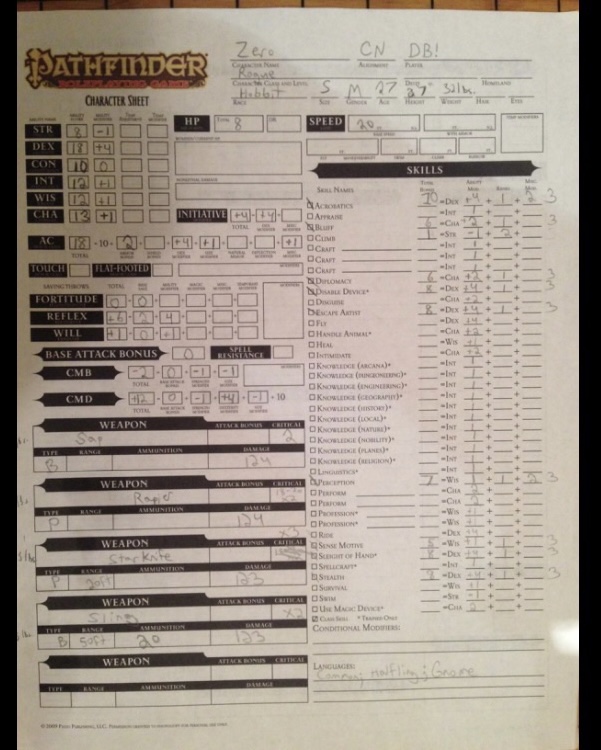In 2017, I somehow ended up playing several games of Pathfinder, a Dungeons & Dragons-like role-playing board game. I say “somehow” because these types of games generally require social interaction with multiple other people (which I am traditionally quite poor at and anxious about partaking in).
Even so, my best (and only) local friend had ambitions to serve as a “Dungeon Master”, and somehow my wife and I ended up roped into attending a few sessions of table-top adventuring with him and two random people (“a few sessions” because the campaign abruptly ended without resolution).

My first character I ever created was a Hobbit (I rejected the use the official name of “Halfling” that the game tried to insist upon for the race): the mysterious Zero Cool, a thief and opportunist of the Rogue class. I chose the name in honor of Lelouch vi Britannia’s masked identity from the Code Geass anime, Zero, who became a symbol of rebellion and a messianic figure to the subjugated Japanese (you may have noticed by now that I have a real thing for saviors).
It was uncomfortable for me having to work on a “team” where I didn’t know half the other people at all and they weren’t familiar with my quirks or personality, so I don’t think we gelled very naturally. I actually don’t have a very solid recollection of those games at all, beyond that Brienne of Tarth the Paladin was in our party (played by a dude) and my wife was playing as some classic (I think Ranger) that could control a bird as an animal companion. Had we kept playing, I have little doubt she would have eventually had a dinosaur familiar. Alas.
I’m not sure how the “Cool” part of Zero’s name came about, but I’m guessing it was someone else’s suggestion–I would have wanted the name kept as one word to make it simpler and more enigmatic, I think. I had all sorts of potential plot twists and story arcs masterminded for Zero, but none of them were ever able to come to fruition during our brief campaign (since we ultimately only played about 3 or 4 quests before the party fell apart forever).
Even so, in just a few hours of role-playing I had developed the template and playstyle for all the future characters I’d play in other tabletop RPGs: the trouble-making rebel who breaks off from the rest of the party, striking out on their own to claim every treasure chest for good and devastate all of the enemies in the name of success for the group as a whole, regardless of the characters’ actual attributes or intended gameplay.
Rebellious in all manner of unexpected situations, confident in their own abilities and comfortable breaking the rules, this is the type of character that I naturally gravitate toward liking and playing as. It’s the kind of personality that’s always appealed to me and that I’ve always sort of envisioned as having myself.
But as much as I love role-playing that type of person in a game, doing so also highlights to me the fact that the actual ethics and morals hardwired into me that I can’t get past are nowhere near as cool as those of the made-up characters I can take control of and briefly live vicariously through. It’s a bitter reality, but having knowledge of and being reminded of it pushes me to work to grow and change so that I can surpass my limitations.
